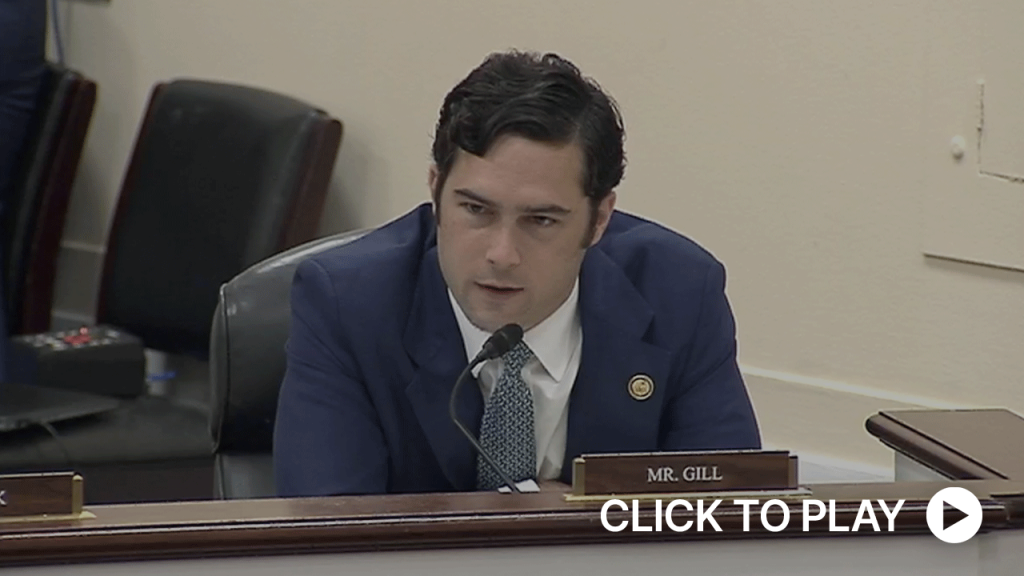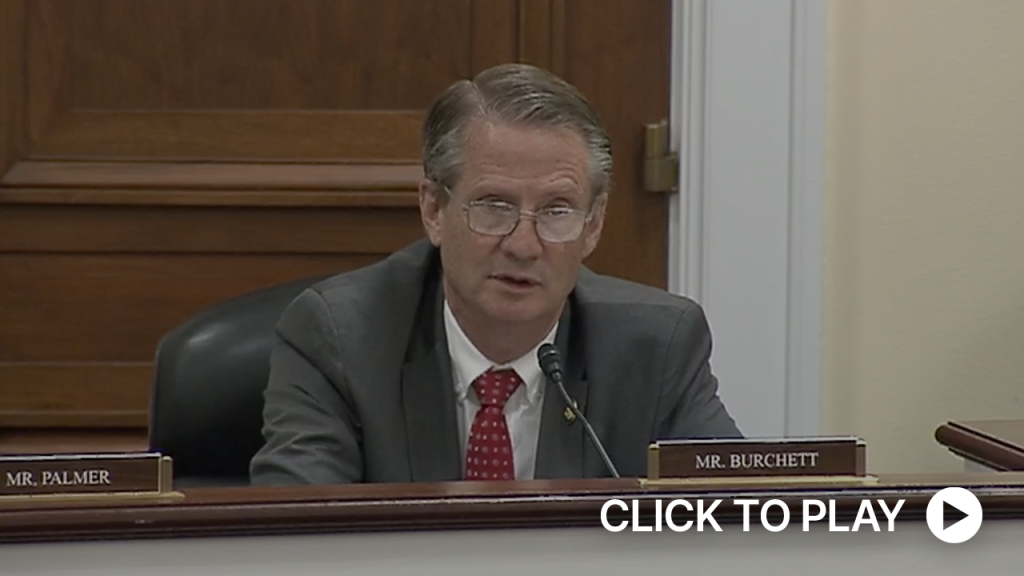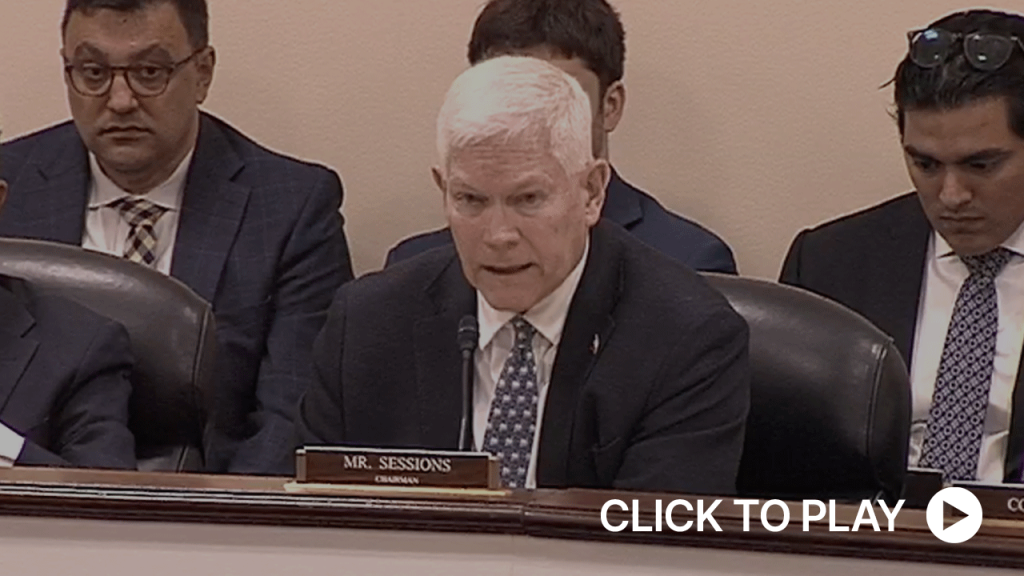
Hearing Wrap Up: DOD Must Obtain Clean Audit to Protect Taxpayer Dollars, Ensure Military Readiness
WASHINGTON—The Subcommittee on Government Operations today held a hearing on “Tracking Progress: Updates to DOD’s Financial Management Scorecard.” After failing seven financial audits, members examined the Department of Defense’s (DoD) progress towards addressing financial management challenges. Members also discussed how DoD can leverage lessons learned from the U.S. Marine Corps, the only service to receive a clean audit opinion. Subcommittee Chairman Pete Sessions (R-Texas) and Ranking Member Kweisi Mfume (D-Md.) pledged to work together in a bipartisan manner to bring fiscal responsibility to DoD to ensure stewardship of taxpayer dollars and military readiness.
Key Takeaways:
DoD has consistently been a bad steward of taxpayer dollars due to lax financial management and an inability to adequately track assets.
- Asif Khan—a Director of Financial Management Assurance at the Government Accountability Office (GAO)—testified: “DoD spends over $1 trillion annually to provide the military forces needed to deter war and to protect the security of the United States. DoD’s spending makes up almost half of the federal government’s total discretionary spending, and its physical assets make up about 82 percent of the federal government’s total physical assets. Without having sound financial management practices and reliable, useful, and timely financial information routinely available, DoD risks being unable to effectively and efficiently manage its budgets and assets and ensure accountability and stewardship over its extensive resources. However, as of fiscal year 2024, DoD is the only one of the 24 agencies subject to the Chief Financial Officers Act of 1990 (CFO Act) that has never obtained an unmodified or ‘clean’ audit opinion on its financial statements, primarily due to serious financial management and system weaknesses.”
- Brett Mansfield—the Deputy Inspector General for Audit at the U.S. DoD Office of Inspector General—testified: “Within the audit report, the DoD OIG identified DoD Agency-Wide material weaknesses, which are weaknesses in internal controls that are so significant that they could prevent management from detecting and correcting a material misstatement in the financial statement in a timely manner.”
Passing an audit is critical to stewarding taxpayer resources and supporting the warfighter. DoD can leverage lessons learned from the U.S. Marine Corps—the only service to obtain a clean audit opinion.
- Lt. General James H. Adams III—the Deputy Commandant for Programs and Resources at the U.S. Marine Corps—testified how the service obtained a clean audit. He stated that leadership from the top, modernizing technology, asset accountability, and data standardization are critical to obtaining a clean audit opinion.
- He further testified: “Readiness for the Warfighter means being accountable for our assets, knowing where they are, and in what condition they can be found, at a moment’s notice. It also means having accurate, timely, and relevant information in the hands of the decision makers so that the smartest, wisest determinations can be made to successfully carry out the mission. Make no mistake, passing an audit makes us more ready to fight when our Nation calls.”
The House Oversight Committee’s Government Operations Subcommittee, which has a long history of conducting oversight of DoD’s financial management challenges, will partner with the Trump Administration to bring fiscal sanity to DoD.
- Last Congress, Subcommittee Chairman Sessions held a hearing to bring transparency to DoD’s financial management practices and also requested the GAO’s ongoing assistance in analyzing the results of DoD’s fiscal year 2024 audits.
- Subcommittee Chairman Pete Sessions (R-Texas) noted in his opening statement, “Last Congress we were told that for DoD to achieve a clean opinion by December 2028, they need to make significant progress by 2026. This is why we are here, having this discussion.”
- Secretary Pete Hegseth has committed to a clean DoD audit, and the Government Operations Subcommittee leadership will seek to partner with him to accomplish this goal.
Member Highlights:
Rep. Brandon Gill (R-Texas) discussed with Brett Mansfield, a witness from the U.S. DoD Office of the Inspector General, why DoD has not been able to pass an audit.
Rep. Gill: “Could walk us through some of the high-level reasons why the DoD hasn’t been able to pass an audit?”
Mr. Mansfield: “Well, it goes back to what we we’ve been talking about here. Systems is one of the main things, right? And then, more importantly, you can have the best system in the world, but if the data that’s within that system isn’t active, reliable, and supported, the system doesn’t matter. So, it gets to the fundamentals of accounting and just operationalizing good controls. So when you receive a shipment, you count how many things are in it, you validate that the cost of your charge is what you expected, you make sure you got the right line of funding to pay for that, then you make sure it’s in your books in the appropriate place so you know where it’s at and what the condition is. If those pieces are missing, the systems aren’t going to matter. And then, as Mr. Kahn indicated, the other thing is the planning process for the department in the way it makes decisions. They’re made piecemeal. They’re made throughout the department individually for the good of the individual entity, not always with consideration for the overall DoD approach. So, I think that is one of the reasons you have so many problems setting milestones and sticking with them, is so many individuals making decisions for their own interests versus stepping back and saying, ‘what’s the best system for multiple entities at the same time?’”
Rep. Tim Burchett (R-Tenn.) discussed with witnesses what actions the U.S. Marine Corps took to obtain a clean audit.
Rep. Burchett: “Why is the Marine Corps able to complete a clean audit but no one else at the Pentagon is?”
Mr. Mansfield: “It was a deliberate and long-term effort to get to that point [ …] So, there was about a three-year cycle. It was a two-year audit, but they capitalized on a lot of work that was performed in previous financial statement audits to look at accountability and how testing results were coming out. They are implementing a new system, DAI, which has some inherent controls within it. And then they validated the information within that through a substantive testing effort. So, it’s a very labor-intensive effort taking—actually a little over two years, extended past the November deadline into February—in order to actually get the full financial standing and audit testing completed. So, it was deliberate in the kind of, I think, very manual with what I refer to as the ‘brute force auditing approach.’ It’s not your standard approach of doing internal control testing.”
Rep. Pete Sessions (R-Texas), the chairman of the Government Operations Subcommittee, concluded that the panel will continue to work in a bipartisan manner with the Department of Defense with the goal of obtaining a clean audit in 2028.
Rep. Sessions: “We see a common goal. We will be together, engaged in the Department of Defense at the highest level. We also recognize that the changes that have been made in these areas, right, wrong or indifferent, were made, and it will be important for us to have a commitment from those who are replacing them and are a part of that moving forward, to be prepared for 2028. I think you’ve given us a model, you showed us how a baseline is important in the attributes of success, not just to the management of the organization, but to where, all the way up and down, people have an idea about their preparedness.”
Click here to watch the hearing
Distribution channels: U.S. Politics
Legal Disclaimer:
EIN Presswire provides this news content "as is" without warranty of any kind. We do not accept any responsibility or liability for the accuracy, content, images, videos, licenses, completeness, legality, or reliability of the information contained in this article. If you have any complaints or copyright issues related to this article, kindly contact the author above.
Submit your press release


